
Aug 18
/
Victor Arduin
Macroeconomics Weekly Report - 2023 08 18
Back to main blog page
"Recently, concerns about a crisis in China's real estate sector have increased, following news that Country Garden, one of the country's leading real estate companies, has failed to pay its dollar-denominated debt."
Risks Continue to Surround Chinese Growth
- Risks emerge from China as companies like Country Garden raise concerns of more defaults in the future.
- Due to the size of the real estate sector in China, the prolonged slowdown is affecting other segments. Industrial production fell to 3.7% from 4.4% in the annual comparison in July.
- Amidst the need for stimuli, the country has cut interest rates, trying to introduce credit policies to boost consumption.
- Another focus of concern is the stock market, which has faced devaluations, increasing the risks of a capital flight cycle in the country.
Introduction
The Chinese real estate sector is causing a lot of concern among analysts, raising the debate about the country's financial health and its chances of achieving its growth target this year.
Just last week, a series of data on the Chinese economy was released and several sectors continue to bring pessimism. The industrial production and trade sales registered a decrease in the annual comparison, frustrating market expectations.
Unemployment rose to 5.3% last July in China. In addition to the data showing a worsening in the labor market, the country suspended the disclosure of unemployment among young people, numbers that raised concern and had reached a record level of 21.3% in June.
Image 1: Unemployment Rate in China (%)
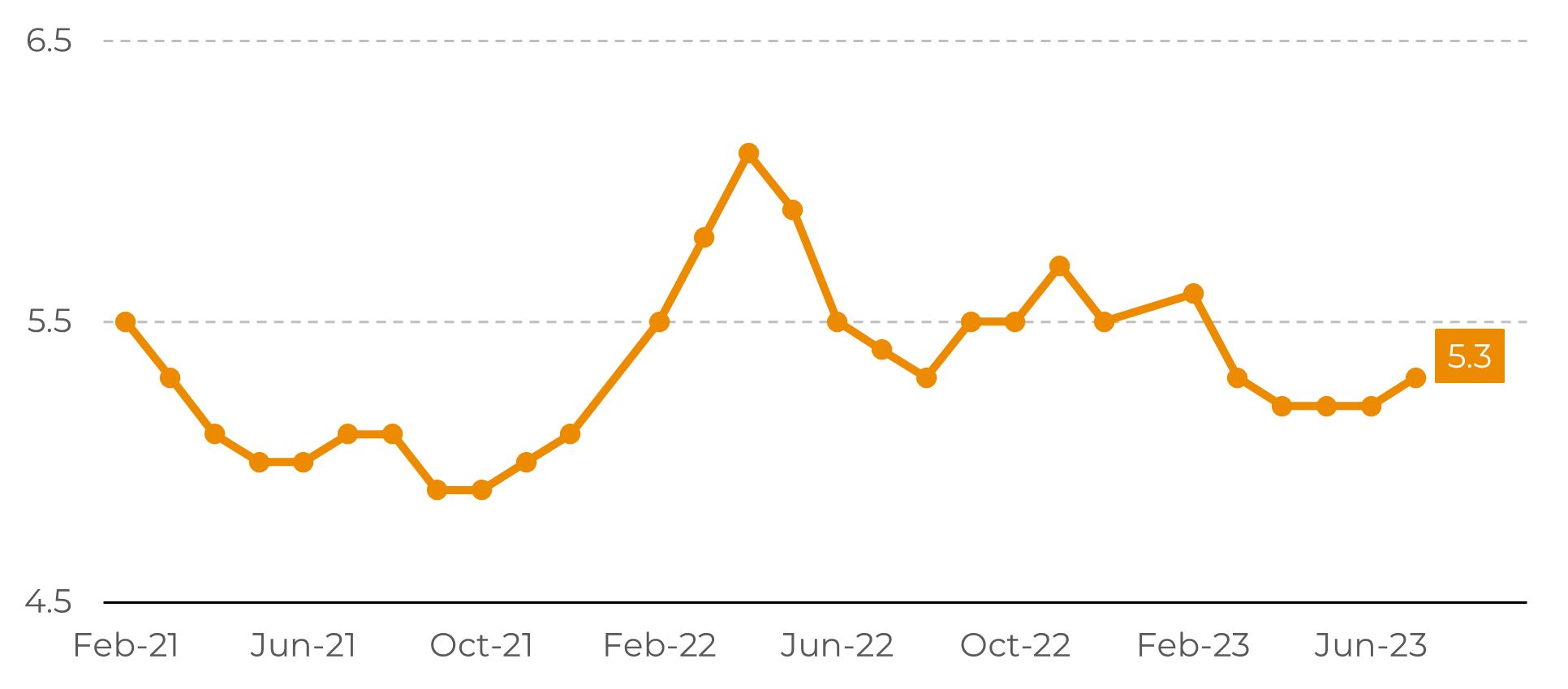
Source: Refinitiv
Image 2: China Fixed Asset Investment (%)
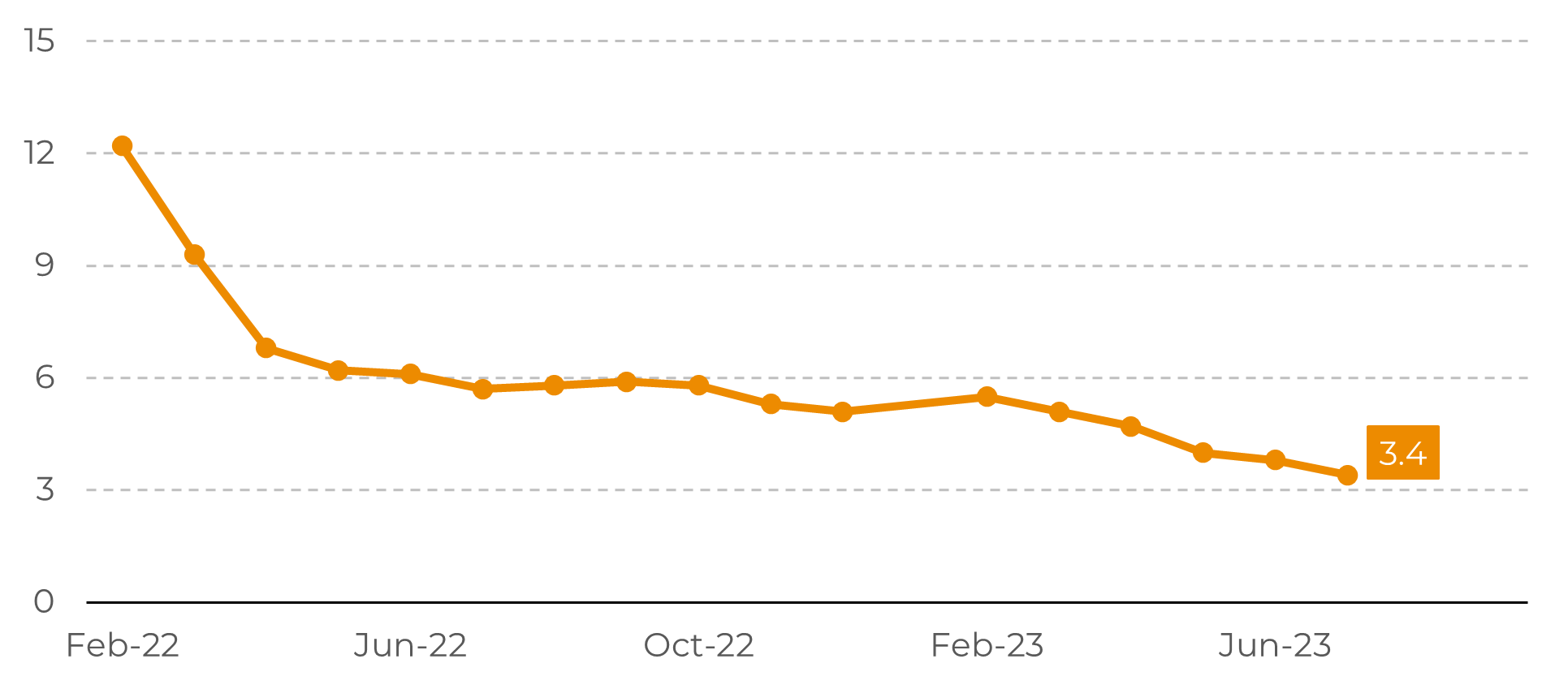
Source: Refinitiv
Real estate crisis in China?
Recently, concerns about a crisis in China's real estate sector have increased, following news that Country Garden, one of the country's leading real estate companies, has failed to pay its dollar-denominated debt. The Chinese economy has seen slower-than-expected growth and difficulty in stimulating the country's consumer confidence, which is largely anchored in the real estate sector.
The segment is extremely important for the economy, responsible for almost a third of the country's gross domestic product (GDP) and for a fifth of all investment in fixed assets. Analysts are already starting to project that the country will have difficulty reaching the official 5% growth target. Therefore, the country's authorities need to carry out more stimulus focused on the sector to help its slowing economy.
Image 3: Sales of Residential Building YoY (%)
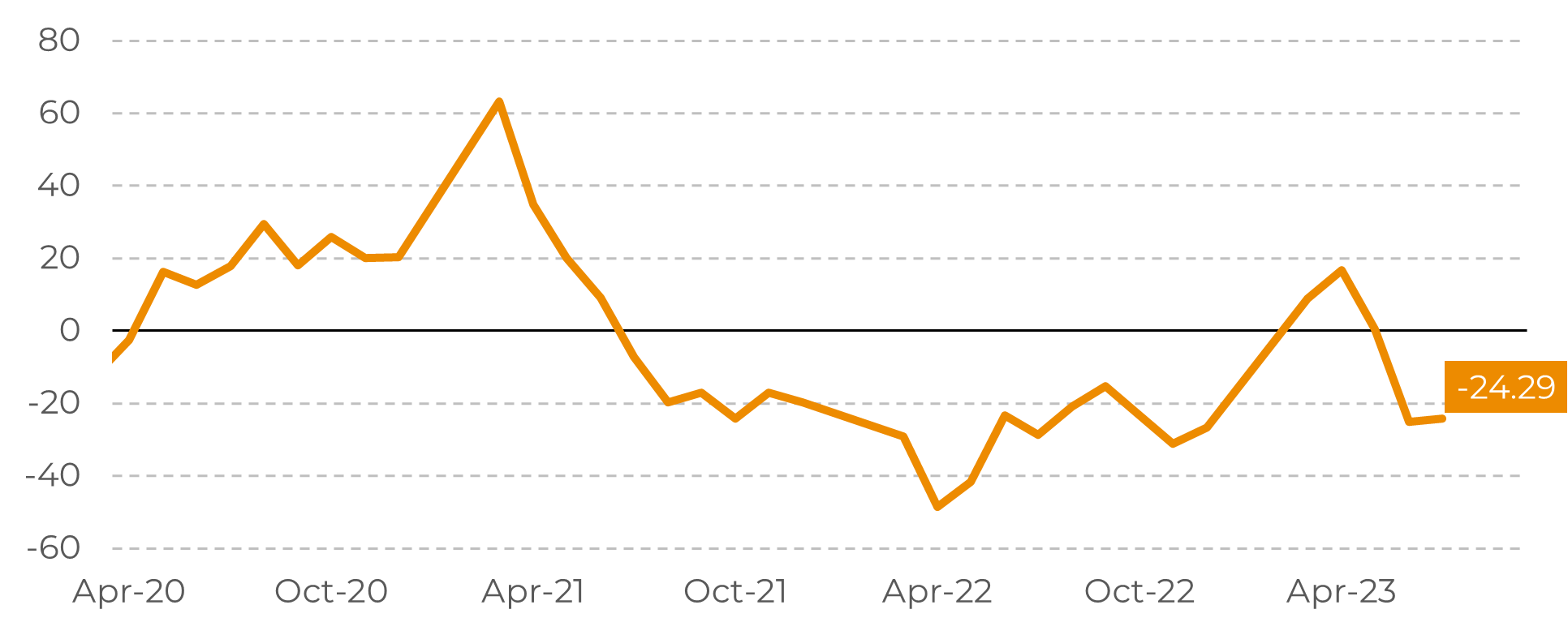
Source: Bloomberg
Meanwhile, last week's data showed that industry and trade data came in below expectations, raising risk premiums significantly in the external environment. The country is a major exporter and importer to the world, and the reduction of its economic activity brings risks to the trade of other nations.
The added value of production by industrial companies reached 3.7% in July in the annual comparison, below the 4.4% expected by the market and a retreat in the annual comparison of June, when it registered an increase of 4.4%. The prolonged weak performance in the real estate construction sector is leading to lower activity in the country's industrial sector, where weakened demand ends up reflecting in lower inventories and production for the sector. Commerce sales also suffered a retreat, growing 2.5% in the month of July in the annual comparison, below the expectation of 4.5%.
Image 4: Growth in Industrial Production and Retail Sales YoY (%)
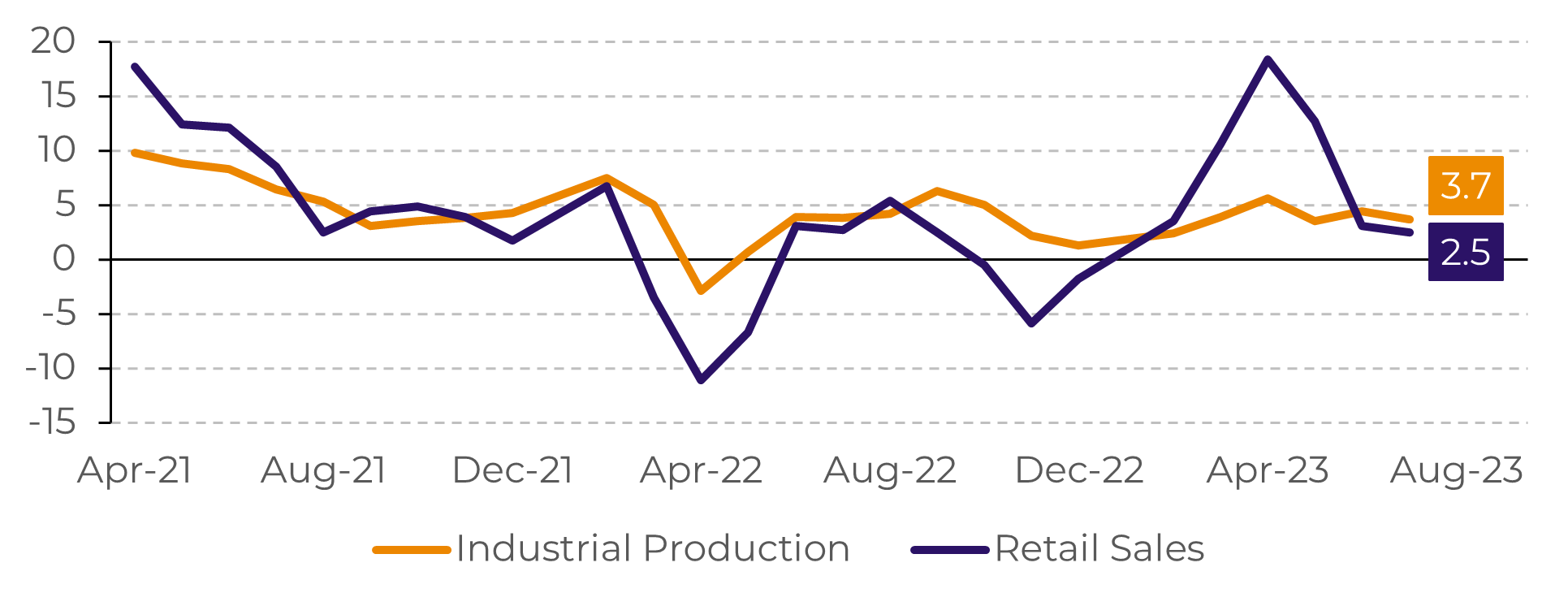
Source: National Bureau of Statistics of China
Surprise Interest Rate Cut
China's monetary authorities cut the interest rate on one-year medium-term loans from 2.65% to 2.50% last week and the Loan Prime Rate (LPR) by 10 basis points from 3.55% to 3.45% on the last 21st. The government seems to be very concerned about the health of its financial system, and is intensifying efforts to expand its monetary policy to boost the country's economy, which has been slowing down.
Meanwhile, the fall in the country's stock indexes is raising fears that the worst may yet come, with the possibility of a capital flight cycle due to deflationary data, a slowdown in the real estate market and a crisis in the parallel lending sector.
Image 5: Chinese Stock Market Index
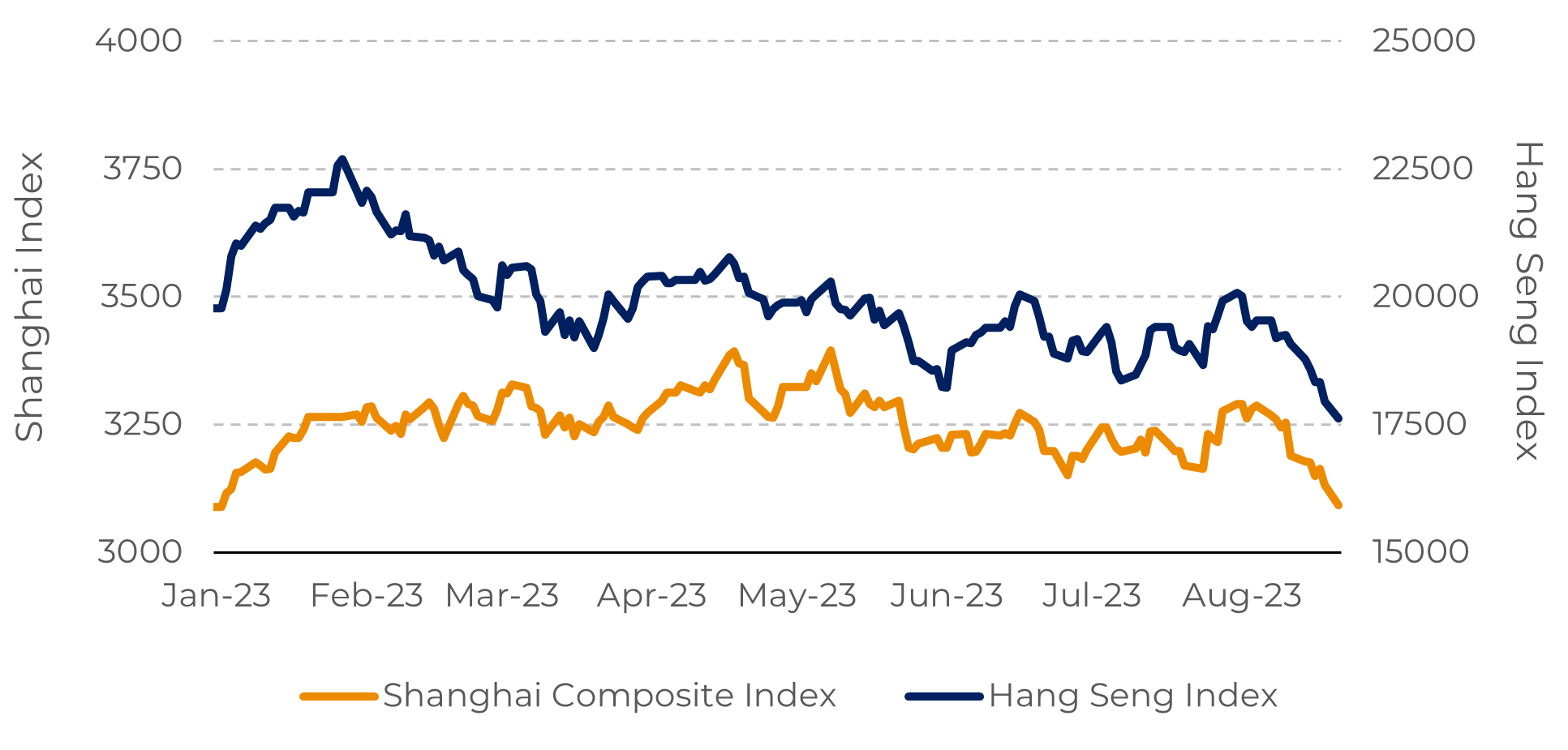
Source: Refinitiv
In Summary
Analysts are already beginning to question China's conditions for reaching the official 5% growth target for the year 2023. The central problem for the country today is how to rescue consumer confidence and create conditions for its real estate market to recover. Due to the importance of the segment for the country's economy, its poor performance ends up affecting other sectors such as industry, which slowed down in July.
While the rate cuts are an important signal to the market, China needs more stimulus to boost its slowing economy. Some events are raising more concerns about the risks facing the country. The defaults announced by major real estate companies are an example, and the Country Garden case, despite being recent, may not have been the last.
The continuity of the Chinese slowdown contributed to a more challenging macro scenario for commodities and emerging currencies, given that the country is the main importer of several products and one of the main trading partners of several emerging countries.
Weekly Report — Macro
Written by Victor Arduin
victor.arduin@hedgepointglobal.com
victor.arduin@hedgepointglobal.com
Reviewed by Alef Dias
alef.dias@hedgepointglobal.com
alef.dias@hedgepointglobal.com
www.hedgepointglobal.com
Disclaimer
This document has been prepared by hEDGEpoint Global Markets LLC and its affiliates ("HPGM") exclusively for informational and instructional purposes, without the purpose of creating obligations or commitments with third parties, and is not intended to promote an offer, or solicitation of an offer, to sell or buy any securities or investment products. HPGM and its associates expressly disclaim any use of the information contained herein that may result in direct or indirect damage of any kind. If you have any questions that are not resolved in the first instance of contact with the client (client.services@hedgepointglobal.com), please contact our internal ombudsman channel (ouvidoria@hedgepointglobal.com) or 0800-878-8408 (for clients in Brazil only).
Contact us
hedgepointhub.support@hedgepointglobal.com
ouvidoria@hedgepointglobal.com
Funchal Street, 418, 18º floor - Vila Olímpia São Paulo, SP, Brasil
Check our general terms and important notices.
This page has been prepared by Hedgepoint Schweiz AG and its affiliates (“Hedgepoint”) solely for informational and instructional purposes, without the purpose of instituting obligations or commitments to third parties, nor is it intended to promote an offer, or solicitation of an offer of sale or purchase relating to any securities, commodities interests or investment products. Hedgepoint and its associates expressly disclaim any use of the information contained herein that directly or indirectly result in damages or damages of any kind. Information is obtained from sources which we believe to be reliable, but we do not warrant or guarantee the timeliness or accuracy of this information. The trading of commodities interests such as futures, options, and swaps involves substantial risk of loss and may not be suitable for all investors. You should carefully consider wither such trading is suitable for you in light of your financial condition. Past performance is not necessarily indicative of future results. Customers should rely on their own independent judgement and/or advisors before entering in any transaction.Hedgepoint does not provide legal, tax or accounting advice and you are responsible for seeking any such advice separately.Hedgepoint Schweiz AG is organized, incorporated, and existing under the laws of Switzerland, is filiated to ARIF, the Association Romande des Intermédiaires Financiers, which is a FINMA-authorized Self-Regulatory Organization. Hedgepoint Commodities LLC is organized, incorporated, and existing under the laws of the USA, and is authorized and regulated by the Commodity Futures Trading Commission (CFTC) and a member of the National Futures Association (NFA) to act as an Introducing Broker and Commodity Trading Advisor. HedgePoint Global Markets Limited is Regulated by the Dubai Financial Services Authority. The content is directed at Professional Clients and not Retail Clients. Hedgepoint Global Markets PTE. Ltd is organized, incorporated, and existing under the laws of Singapore, exempted from obtaining a financial services license as per the Second Schedule of the Securities and Futures (Licensing and Conduct of Business) Act, by the Monetary Authority of Singapore (MAS). Hedgepoint Global Markets DTVM Ltda. is authorized and regulated in Brazil by the Central Bank of Brazil (BCB) and the Brazilian Securities Commission (CVM). Hedgepoint Serviços Ltda. is organized, incorporated, and existing under the laws of Brazil. Hedgepoint Global Markets S.A. is organized, incorporated, and existing under the laws of Uruguay. In case of questions not resolved by the first instance of customer contact (client.services@Hedgepointglobal.com), please contact internal ombudsman channel (ombudsman@hedgepointglobal.com – global or ouvidoria@hedgepointglobal.com – Brazil only) or call 0800-8788408 (Brazil only).Integrity, ethics, and transparency are values that guide our culture. To further strengthen our practices, Hedgepoint has a whistleblower channel for employees and third-parties by e-mail ethicline@hedgepointglobal.com or forms Ethic Line – Hedgepoint Global Markets.Security note: All contacts with customers and partners are conducted exclusively through our domain @hedgepointglobal.com. Do not accept any information, bills, statements or requests from different domains and pay special attention to any variations in letters or spelling, as they may indicate a fraudulent situation.“HedgePoint” and the “HedgePoint” logo are marks for the exclusive use of HedgePoint and/or its affiliates. Use or reproduction is prohibited, unless expressly authorized by HedgePoint. Furthermore, the use of any other marks in this document has been authorized for identification purposes only. It does not, therefore, imply any rights of HedgePoint in these marks or imply endorsement, association or seal by the owners of these marks with HedgePoint or its affiliates.
We have updated our Terms & Conditions to reflect improvements to our platform, data handling practices, and the overall experience we provide to our clients.
To continue using the Hedgepoint HUB, please review and accept the updated terms.

